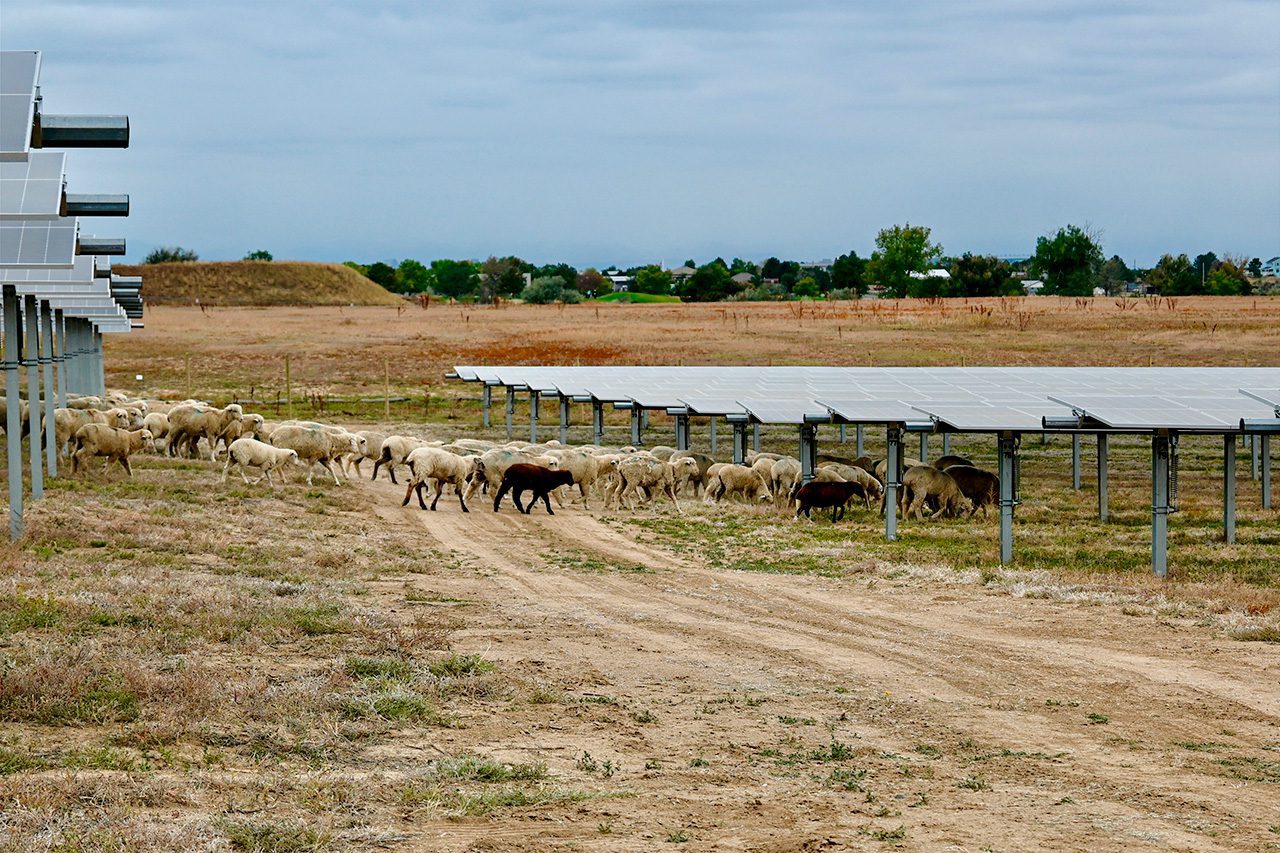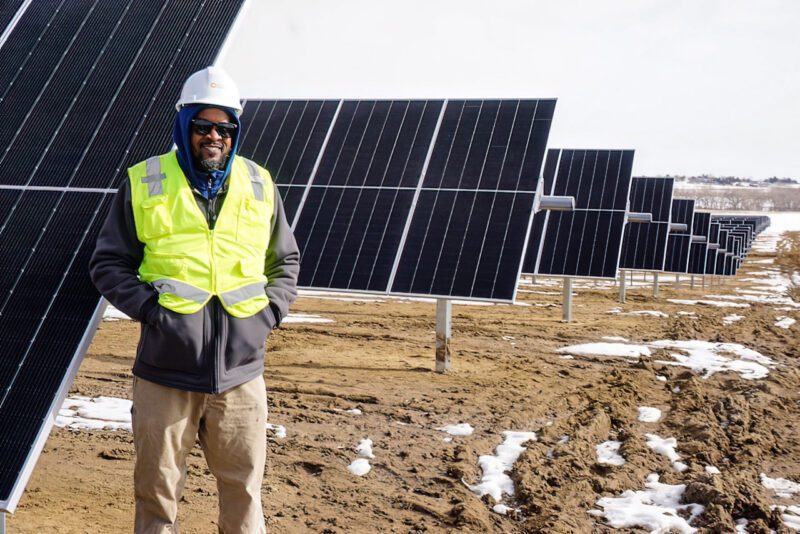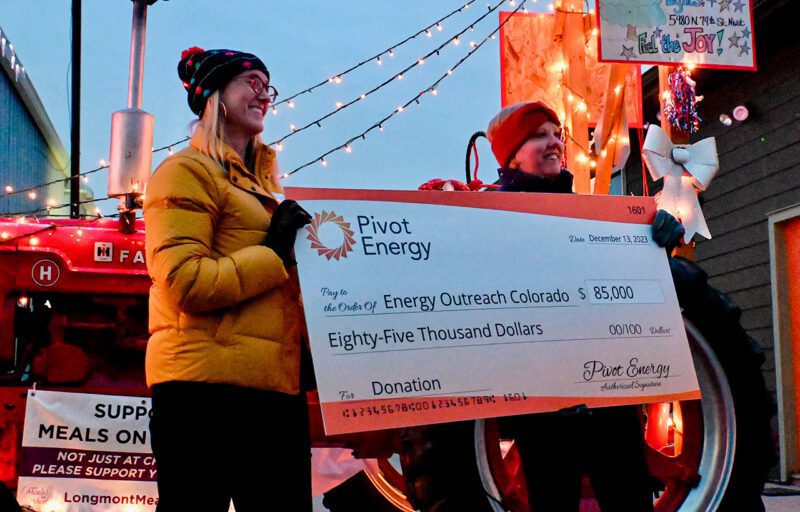Unplastifying the Future
Tati Besada’s mission to restore our oceans

A Pivot Energy agrivoltaic community solar farm in Colorado that harnesses the dual power of regenerative agriculture and solar photovoltaic arrays. Photo courtesy of Pivot Energy.
Twenty twenty-three stands out as a pivotal year for climate action and the expansion of renewable energy. In the United States, an impressive 33 gigawatts (GW) of solar energy are projected to be integrated into the national grid by year’s end, reaffirming solar power’s status as the most rapidly expanding energy source. Forecasts by the International Energy Agency suggest a remarkable shift by 2027, with solar expected to eclipse both coal and natural gas to become the predominant energy generation source in terms of cumulative power capacity by technology. Concurrently, there is an intensified commitment to ensuring that the transition to clean energy yields significant dividends for working families and lower-income households —the very communities that stand to benefit most from the creation of new jobs and the reduction of energy expenses.
Businesses possess a unique leverage point: their energy procurement strategy. This can be a pivotal tool in driving an equitable and fair clean energy transition. Over the coming decade, the corporate appetite for renewable energy to power operations and achieve ambitious emissions reductions targets is anticipated to surge dramatically. Simultaneously, there is an increasing introspection within businesses about their community impact, prompting a more robust integration of social impact objectives within their corporate strategies. Where once environmental and social responsibilities operated in separate spheres, they are now converging. This presents a vital juncture for those in sustainability and energy procurement, along with their stakeholders, to weave together the procurement of clean energy and community enrichment into a single, harmonious strategy.
For corporations committed to reducing their carbon footprint, the procurement of renewable energy presents not only a pathway to decarbonization but also a strategic opportunity to drive energy equity and bolster social impact. This approach can significantly enhance consumer trust. Insights from a recent Harvard Business Review survey indicate that authentic engagement with sustainability goals — those that embody compassion and prioritize human values — is a cornerstone of building trust with customers. Notably, Gen Z and Millennials, wielding a formidable collective annual buying power of $685 million, are markedly more inclined (27% more likely, to be precise) to patronize brands that demonstrate genuine concern for their ecological footprint and societal impact.
Community solar subscriptions hold immense promise as a vehicle for immediate relief as the cost of living continues to rapidly increase.
From an investment perspective, a striking 89% of investors now weigh Environmental, Social, and Governance (ESG) factors in their financial deliberations. Beyond the imperative to curb emissions and pursue eco-friendly practices, there is a robust call from both consumers and investors for business strategies that not only protect the environment but also engender positive change within local communities — particularly for working families and vulnerable groups. In light of the U.S.’s current energy inequities, the urgency for such people-centered sustainability objectives has never been greater.
In the United States, a significant portion of the population — representing approximately 25% of households or over 30 million homes — is faced with a high energy burden. This term describes the disproportionate and unsustainable share of household income that is devoted to energy costs. Alarmingly, low-income families bear an energy burden that is nearly triple that of their higher-income counterparts, absorbing on average 8.3% of their income compared to the national average of 3%, despite lower energy consumption. The disparity is even more pronounced among racial lines: Black households face an energy burden 43% higher than white households, and Latino households’ energy burden stands 20% higher, underscoring a systemic inequity in energy affordability.

Community solar subscriptions hold immense promise as a vehicle for immediate relief as the cost of living continues to rapidly increase. By alleviating the energy burden and enhancing energy assistance, these programs can offer long-term financial stability through consistent savings on monthly bills. Such initiatives empower those with limited incomes and vulnerable demographics to be active participants in, and beneficiaries of, the clean energy transition. Despite this potential, a mere fraction — less than 3% — of community solar garden capacity is allocated for low-income households, indicating a gap between the promise of community solar and its actual reach.
The Inflation Reduction Act, with its inclusion of initiatives aimed at boosting low-income household engagement in community solar, portends a rapid shift in the current landscape. Nevertheless, the infusion of federal funds alone is insufficient. To forge a path towards meaningful change and a truly equitable energy transition, it is essential to establish partnerships driven by impact. These collaborations, between solar developers and businesses intent on securing renewable energy, are crucial in bridging the financial voids that prevent broader access for low-income families.
There is a discernible momentum among leading corporations to innovate in the realm of renewable energy procurement by synergizing it with social impact and energy justice objectives. This movement, which melds environmental responsibility with societal benefits, is not just commendable but is set to become a mainstay in the industry.
Leading by example, Microsoft has positioned itself at the forefront of this trend. In 2021, it announced a pioneering partnership with Volt Energy, committing to a 250 megawatt (MW) solar energy procurement. Notably, a share of the revenue from this solar venture is allocated to foster economic development in underserved communities. Similarly, Rivian is collaborating with solar energy developer BrightNight and The Nature Conservancy to repurpose a Kentucky coal mine into a solar energy hub, prioritizing economic benefits to the local community. Google has also joined the movement, engaging with EDPR to purchase 500MW of Impact Renewable Energy Certificates — ‘Impact RECs’ — which channel significant funds towards non-profits that are dedicated to alleviating the energy expenses of low-income households.

Pivot Energy presenting their recent donation to Energy Outreach Colorado, a partnership aimed to address energy insecurity in Colorado. Photo courtesy of Pivot Energy.
Pivot Energy is at the vanguard of community solar initiatives, currently developing 41 megawatts (MW) of solar gardens. All bill the bill credits from these solar gardens are pledged to 8,200 low and moderate-income Colorado households, offering them substantial savings on electricity. Each household stands to save an average of nearly $800 annually, a significant sum that can instead support groceries, childcare, and other essential expenses. The prevalence of energy insecurity in Colorado, where one in every four households faces challenges in affording basic energy needs, is a stark reality. Such insecurity often forces families to forgo essential needs to cover energy costs, risking health and wellbeing. To address this, Pivot Energy is collaborating with Energy Outreach Colorado to extend energy bill assistance to those subscribing to their solar gardens, thus taking a concrete step towards mitigating energy poverty.
Businesses and corporations with goals to lower carbon emissions are presented with a breadth of options in renewable energy providers. Pivot Energy endorses the Clean Energy Buyer Institute’s Principles for Purpose-Driven Energy Procurement, a benchmark for responsible and impactful clean energy development. This framework invites developers and corporate energy buyers to engage in projects that not only demonstrate conscientious land use but also confer direct benefits upon local communities. Partnering with renewable energy providers that champion both carbon reduction and community welfare can significantly enhance a company’s brand trust among consumers, improve ESG performance, and most importantly, yield substantial, positive change for communities in need.
When the welfare of the planet, the pursuit of profit, and the interests of people are given equal weight, the business sector has the potential to become a transformative force, addressing energy injustices and creating solutions that once seemed beyond reach.
Related Content
Comments
Deep Dives

Featuring
Clarisse Awamengwi
IE Correspondent
July 17 - 12:00 PM EST

Featuring
Russell McLeod
July 24 - 12:00 PM EST
RECENT
Editor's Picks
Webinars
News & Events
Subscribe to our newsletter to receive updates about new Magazine content and upcoming webinars, deep dives, and events.
Become a Premium Member to access the full library of webinars and deep dives, exclusive membership portal, member directory, message board, and curated live chats.
At Impact Entrepreneur, we champion fearless, independent journalism and education, spotlighting the inspiring changemakers building the Impact Economy. Diversity, equity, sustainability, and democracy face unprecedented threats from misinformation, powerful interests, and systemic inequities.
We believe a sustainable and equitable future is possible—but we can't achieve it without your help. Our independent voice depends entirely on support from changemakers like you.
Please step up today. Your donation—no matter the size—ensures we continue delivering impactful journalism and education that push boundaries and hold power accountable.
Join us in protecting what truly matters. It only takes a minute to make a real difference.
0 Comments